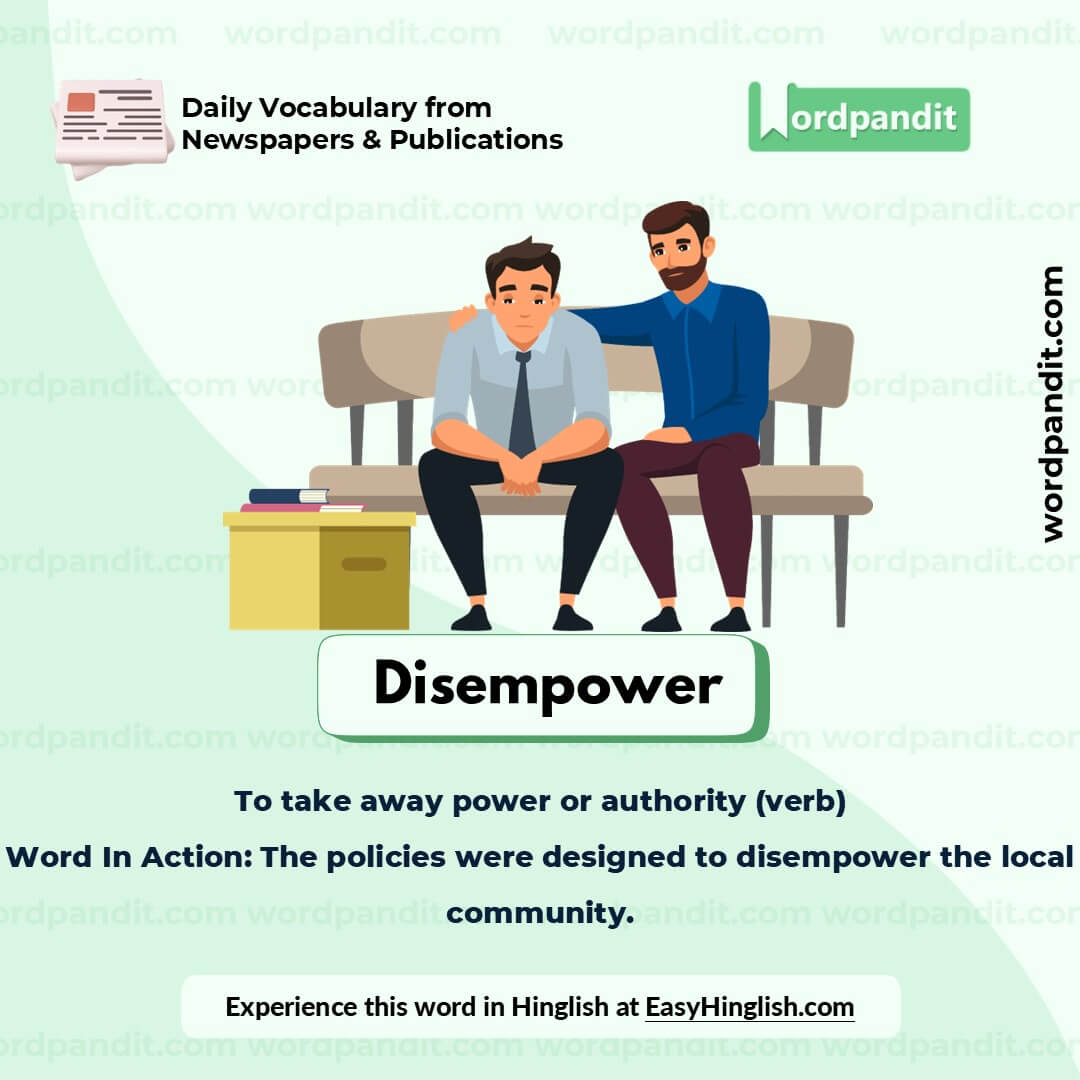Daily Vocabulary from Indian Newspapers and Publications
Welcome to Wordpandit’s Indian Vocabulary Hub
At Wordpandit, we understand the importance of staying rooted in the local context while expanding your language skills. This section focuses on enriching your vocabulary with words and phrases drawn from India’s leading newspapers and publications, ensuring you're learning vocabulary that is practical, relevant, and uniquely Indian.
Why Indian Sources Matter
We believe that the best way to master any language is by immersing yourself in local content. That’s why we carefully curate vocabulary from top Indian publications, including:
- The Hindu
- The Times of India
- The Economic Times
- Hindustan Times
- Live Mint
- The Indian Express
- And many others...
Stay Updated, Stay Relevant
With daily updates from Indian news sources, you’ll be consistently learning words that reflect the trends and shifts in Indian society and culture. Our focus is to provide vocabulary that enhances your understanding of the language in an Indian context.
How Wordpandit Supports Your Goals
Whether you’re preparing for exams, aiming to improve your professional communication, or simply want to stay connected with the latest Indian vocabulary, Wordpandit is here to guide you every step of the way.
Learn with a Practical Approach
Our interactive learning methodology includes real-world examples, engaging activities, and context-specific usage to ensure that every word becomes part of your active vocabulary.
Dive into Indian Vocabulary Today!
Why Choose Wordpandit?
Practical Learning: Focus on words you'll actually encounter in real-world reading, enhancing your comprehension and communication skills.
Diverse Content: From current affairs to scientific breakthroughs, our varied sources expose you to vocabulary across multiple domains.
Effortless Integration: Make Wordpandit a part of your daily routine. Just a few minutes each day can significantly boost your lexicon over time.
Your Path to Vocabulary Mastery
- Visit our Daily Vocabulary section regularly
- Explore new words and their usage in context
- Practice incorporating these words into your own writing and speech
- Track your progress as your vocabulary expands
Start Your Journey Today
Embark on your vocabulary enhancement journey with Wordpandit. By consistently engaging with our daily posts, you'll build a robust vocabulary that serves you well in academic, professional, and personal contexts.
Remember, a word a day keeps linguistic limitations at bay. Make Wordpandit your daily companion in the quest for vocabulary excellence!
WORD-1: Debacle
Context:
"After its electoral debacle, the BJD is trying to build its base again." - The Hindu
Explanatory Paragraph:
A debacle is a sudden and complete failure, often in a dramatic or humiliating way. It's used to describe situations where things go drastically wrong, like a disastrous political campaign or an economic collapse.
Meaning: A sudden and disastrous failure, often one that is humiliating (noun)
Pronunciation: dih-BAH-kul
Difficulty Level: ⭐⭐⭐ (Intermediate)
Etymology: From French débâcle, meaning "downfall" or "collapse," originally referring to a breaking up of ice in a river.
Synonyms & Antonyms:
Synonyms: disaster, catastrophe, collapse, failure, fiasco
Antonyms: success, triumph, achievement, victory
Usage Examples:
- The company's financial debacle left investors reeling from the losses.
- The team's last-minute strategy led to a complete debacle on the field.
- The poorly planned event turned into a debacle, with guests leaving early.
- His decision to quit his job without another lined up ended in a personal financial debacle.
Cultural Reference:
The "Watergate scandal" is often cited as a political debacle in U.S. history.
Think About It:
What lessons can be learned from a debacle, and how can failure shape future successes?
Quick Activity:
Think of a famous debacle from history. Write a short paragraph about the event and why it was considered a failure.
Memory Tip:
Remember "debacle" by thinking of it as "disastrous break," both starting with "d," indicating a catastrophic failure.
Real-World Application:
Using the word "debacle" is particularly useful when describing events that went unexpectedly wrong, like a failed project or a political campaign.
WORD-2: Oust
Context:
"Priyanka Gandhi Vadra asked the people of Haryana to oust the BJP in the October 5 assembly polls." - The Hindu
Explanatory Paragraph:
Oust means to force someone out of a position of power or authority, typically through action, revolt, or legal process.
Meaning: To remove someone from power or position (verb)
Pronunciation: owst
Difficulty Level: ⭐⭐⭐ (Intermediate)
Etymology: From Middle English ousten meaning "to take away, remove"
Synonyms & Antonyms:
Synonyms: remove, overthrow, expel, displace
Antonyms: install, elect, appoint
Usage Examples:
- The government was ousted after years of corruption scandals.
- The CEO was ousted following a shareholder vote.
Cultural Reference:
The term "oust" is often used in political revolutions, such as the ousting of dictators.
Think About It:
What are the consequences of ousting someone in power without a clear successor?
Quick Activity:
Think of an example from history where a leader was ousted. What was the aftermath?
Memory Tip:
Remember "oust" as the word that sounds like "out," meaning to push someone out of power.
Real-World Application:
Ousting leaders or CEOs is common in the corporate and political world when reforms or changes are needed.
WORD-3: Nefarious
Context:
"The J&K Congress chief said there was 'a nefarious design' behind the process of nominating five MLAs." - The Hindu
Explanatory Paragraph:
Nefarious describes actions or activities that are wicked, evil, or morally wrong. It's used to talk about schemes or intentions that are considered malevolent or criminal.
Meaning: Wicked or criminal (adjective)
Pronunciation: nih-FAIR-ee-uhs
Difficulty Level: ⭐⭐⭐⭐ (Advanced)
Etymology: From Latin nefarious meaning "wicked, unlawful"
Synonyms & Antonyms:
Synonyms: evil, villainous, wicked, immoral, malevolent
Antonyms: honorable, virtuous, righteous, ethical, upright
Usage Examples:
- The villain in the movie had a nefarious plot to take over the world.
- She uncovered a nefarious scheme to defraud the company of millions.
- The politician was accused of nefarious activities during the campaign.
- His nefarious actions eventually caught up with him, and he was brought to justice.
Cultural Reference:
The word "nefarious" is often used to describe the malevolent schemes of villains in literature and films.
Think About It:
Why do people engage in nefarious activities, even when they know the consequences can be severe?
Quick Activity:
Think of a famous character from a book or movie with nefarious intentions. What motivated them?
Memory Tip:
Think of "nefarious" as "not fair to us" to remember that it refers to wicked or evil actions.
Real-World Application:
Nefarious is commonly used in legal, political, and criminal contexts to describe corrupt or criminal activities.
WORD-4: Disempower
Context:
"Their only aim is to disempower Kashmiris." - The Hindu
Explanatory Paragraph:
Disempower means to take away power, authority, or influence from someone or a group of people, leaving them feeling helpless or unable to make decisions.
Meaning: To take away power or authority (verb)
Pronunciation: dis-em-POW-er
Difficulty Level: ⭐⭐⭐ (Intermediate)
Etymology: From Latin dis- (reversal) + empower meaning "to grant power"
Synonyms & Antonyms:
Synonyms: weaken, marginalize, diminish, subdue
Antonyms: empower, strengthen, authorize, enable
Usage Examples:
- The new policies disempower local authorities and centralize decision-making.
- Oppressive laws often disempower minority groups, limiting their rights.
Cultural Reference:
Disempowerment is often discussed in the context of social justice, where certain groups are deliberately stripped of their rights or voices.
Think About It:
Can someone who has been disempowered ever fully regain their sense of authority and influence?
Quick Activity:
Think of an example where a community was disempowered. What were the effects on their society?
Memory Tip:
Remember "disempower" as "taking away power" by breaking down the word into "dis-" (removal) and "empower."
Real-World Application:
Disempower is often used in social and political discussions, particularly regarding laws, rights, and oppression.
WORD-5: Reinvigorated
Context:
"A reinvigorated Mr. Patnaik has been meeting with local leaders from the State." - The Hindu
Explanatory Paragraph:
The word reinvigorated describes a state of renewed energy or enthusiasm. When someone is reinvigorated, they have been revitalized, often after a period of exhaustion or reduced activity. In this context, Mr. Patnaik has regained his enthusiasm and is actively engaging with leaders once again.
Meaning: Given new energy or strength (adjective)
Pronunciation: ree-in-VIG-uh-ray-ted
Difficulty Level: ⭐⭐⭐ (Intermediate)
Etymology: From the Latin prefix "re-" meaning "again" and "invigorare" meaning "to make strong."
Synonyms & Antonyms:
Synonyms: refreshed, revitalized, rejuvenated, energized, renewed
Antonyms: drained, exhausted, fatigued, weakened
Usage Examples:
- The reinvigorated team played with renewed spirit after their coach's motivational speech.
- After a vacation, she felt reinvigorated and ready to tackle her projects.
- The company was reinvigorated by the introduction of new leadership and fresh ideas.
- A good night's sleep left him reinvigorated and ready for the day's challenges.
Cultural Reference:
During times of personal or national struggle, figures such as Winston Churchill were known for reinvigorating their people through speeches and acts of leadership.
Think About It:
What situations in your life make you feel reinvigorated, and how do you respond to that renewed energy?
Quick Activity:
Write about a time when you felt drained or unmotivated. What helped you feel reinvigorated?
Memory Tip:
Think of "reinvigorated" as "re" (again) + "invigorated" (energized), to remember it means being full of new energy.
Real-World Application:
The word "reinvigorated" can be used to describe situations where a person, organization, or group has found new energy or direction, especially after a challenging period.


















